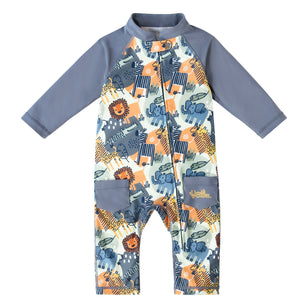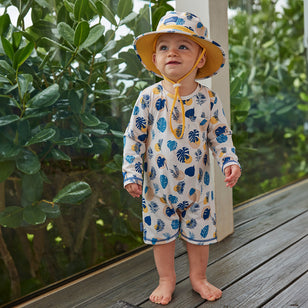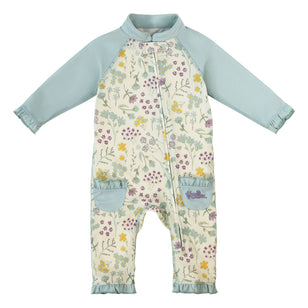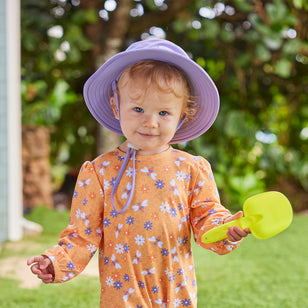Baby Sun Protection Guide: 9 Tips to Keep Your Infant Sun-Safe This Summer
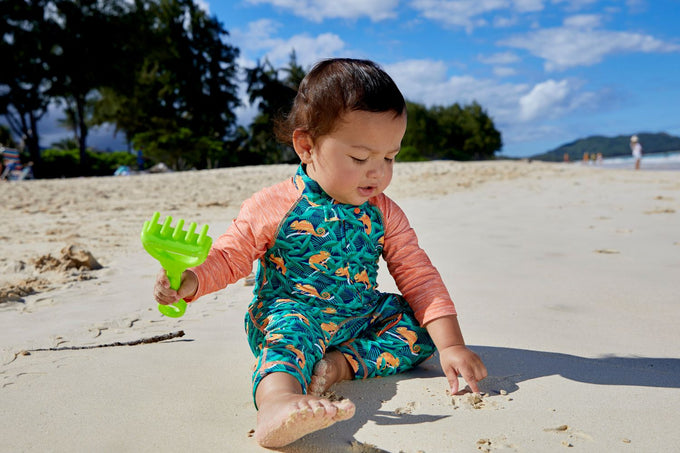
Younger children and babies have more sensitive skin, which makes them more likely to overheat and get sunburnt, especially during summer. They can suffer several serious health risks, which can include heatstroke, heat exhaustion, and dehydration if you aren't careful.
Since children are most susceptible to sun damage during childhood, baby sun protection is vital. Prolonged exposure to sunlight can result in sunburns, skin redness, heat exhaustion, and skin irritation. Keep your little one sun safe with our sun protection tips for summer below.
Why Is Sun Protection Important for Your Baby?
Baby sun protection is imperative since an infant's sensitive skin is prone to severe sunburns. Excessive sun exposure can cause sunburns, skin and eye irritation, skin cancer, and even a damaged immune system, so taking precautions is necessary.
The American Academy of Pediatrics advises keeping babies under 6 months out of direct sunlight for long periods of time, which is totally doable with shade structures, beach umbrellas, or a sun blanket with a UPF 50+ rating.
9 Tips to Keep Your Toddler Safe From the Sun Over Summer
1. Put a Wide-Brim Sun Hat on Your Baby
This protects him/her from harsh UV rays - especially during the hottest parts of the day when the UV index is high.
2. Pack Water and Fruit
Make sure your little one drinks enough fluid to stay hydrated throughout the day. Give them plenty of fluids and fruit to prevent dehydration. We love watermelon and berries.
3. Keep Infants Out of Direct Sunlight for Extended Periods of Time
Babies under 6 months old should be kept out of direct sunlight for prolonged periods of time. Place your infant in the shade, so under a tree, umbrella, or stroller canopy.
To avoid sunburns, dress babies in lightweight UPF clothing that covers their arms and legs, and put a wide-brim sun hat on your little one.
4. Don't Expose Your Baby to the Sun in Peak Sun Hours
Covering up your baby is the primary and best way to prevent damaging ultraviolet radiation (UVR) exposure. Do not expose your baby to the sun between 10 a.m. and 4 p.m., and if you need to, then be sure to cover your baby in UPF clothing or a UPF sun blanket.
5. Choose UPF Baby Clothing with a UPF 50+ Rating
A UPF 50+ rating offers the best sun protection possible. We recommend a baby UPF swimsuit with long sleeves and UPF baby sun legz to cover their cute little legs.
Choose sun-protective clothing and swimwear that is closely knit. UV-protective sunglasses are also a fantastic idea for protecting your child's eyes.
6. Find Shade Whenever Possible
Bring your own shade structure if you know you won't be able to post up under a tree or building with your baby while at the beach or outdoors. We love UPF beach umbrellas.
7. Talk to Your Pediatrician to See if Your Baby Can Wear Sunscreen
While many pediatricians don't recommend putting sunscreen on your baby when he/she is under 6 months of age as your baby's skin is super sensitive then, see what you can do. Ask your pediatrician for sun safety tips to see when would be okay to use sunscreen on your baby's skin.
8. Buy Broad-Spectrum UV Baby Sunglasses
Shield your baby's young eyes from the sun with sunglasses.
9. Pack a Car Seat Cover
For those long car rides to the beach or pool, be sure to cover your infant with a car seat cover with sun protection. We offer a couple of baby car seats in fun prints here at UV Skinz.
Remember: Babies under 6 months of age should not be exposed to sunscreen.
Source: Centers for Disease Control and Prevention
Quick Tips That Will Help You in Case Your Baby Gets Sunburned
It is critical to start treating your baby's sunburn as soon as you see it to help your baby's skin heal and soothe him/her. The first step should be to get out of the sun—preferably indoors.
Source: American Association of Dermatology
Once inside, the following dermatologist's tips can help with a baby's sunburn:
- Cool the skin with cold water.
- Apply a moisturizer or aloe vera to help alleviate any dry skin.
- Keep your baby's room cool.
- Look out for any swelling, blisters, or extreme discomfort, and contact your pediatrician.
Symptoms, such as increasing pain, headache, nausea, fever, vomiting, eye pain, and blisters should be immediately evaluated by a medical professional.
Frequently Asked Questions About Infant Sun Safety
Is it Safe to Apply Sunscreen to My 3-Month-Old?
Dermatologists and pediatricians don't recommend sunscreen for babies younger than 6 months old. Be sure to speak to your pediatrician if you have any concerns or feel your baby should wear sunscreen earlier.
What Is the Best Way to Protect My Newborn From the Sun?
Don't expose your baby to direct sunlight. To keep your infant out of direct sunshine, attach a sunshade to their stroller.
Always keep a shade hat or sunhat in your baby bag. Minimize going out in the sun and in case your baby is exposed to the sun make sure you cover them up with sun-protective clothing.
At What Age Can Babies Be Exposed to Direct Sunlight?
Spending time outside is really beneficial to young children. Older infants and toddlers can withstand sun exposure provided they are suitably shielded.
Babies should be kept out of the sun until they are 6 months old. Children older than 6 months, on the other hand, can go outdoors if they are properly protected from UV rays with sunscreen and/or UPF clothing.
Conclusion
The baby sun protection tips listed above are an excellent resource to keep your babies and toddlers safe from the sun.
However, remember that you can always speak to your pediatrician or another health expert for guidance on any baby care concerns in the event you'd like more tailored support. We hope this helped!

